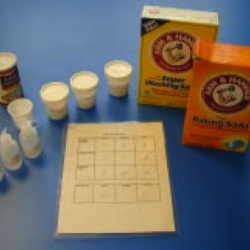Source Institutions
Source Institutions
Add to list Go to activity
Activity link broken? See if it's at the internet archive

In this chemistry challenge, learners identify an unknown white powder by comparing it with common household powders. Learners first explore what happens when baking soda, baking powder, and washing soda are mixed with water, vinegar, and PHTH (the indicator phenolphthalein mixed with alcohol and water). Learners then work to identify the unknown based on how it reacts with the known solutions. This is a simplified form of "qualitative analysis," which was historically an important approach chemists used for identifying unknown samples.
- 10 to 30 minutes
- 10 to 30 minutes
- Over $20 per group of students
- Ages 4 - 14
- Activity, Experiment/Lab Activity
- English
Quick Guide
Materials List (per group of students)
- 25 ml Water
- 25 ml Vinegar
- 25 ml Phenolphthalein (PHTH) solution
- 15 labeled dropping bottles with water
- 15 labeled dropping bottles with vinegar
- 15 labeled dropping bottles with a phenolphthalein solution
- 5 plastic laminated reaction grids
- 9 labeled plastic containers with about 10 grams of baking soda.
- 9 labeled plastic containers with about 10 grams of baking powder
- 9 labeled plastic containers with about 10 grams of washing soda
- 1 cup with baking soda labeled A
- 1 cup with baking powder labeled B
- 1 cup with washing soda labeled C
- 20 thin sticks, small spoons, or spatulas
- Several liters of distilled water for rinsing well plates
- Paper towels for spills
- A container of clean water
- A safe container to dump solutions into and seal (waste container)
Subjects
-
Physical Sciences
-
Chemistry
- Chemical Reactions
- Solutions
-
Chemistry
-
The Nature of Science
-
The Scientific Process
- Asking Questions
- Conducting Investigations
- Gathering Data
- Formulating Explanations
-
The Scientific Process
Audience
To use this activity, learners need to:
- see
- see color
- touch
Learning styles supported:
- Involves hands-on or lab activities
Other
Components that are part of this resource:
This resource is part of:
Access Rights:
- Free access
By:
Rights:
- All rights reserved, Sciencenter,
Funding Sources:
- Camille and Henry Dreyfus Foundation, Inc.
- American Chemical Society
